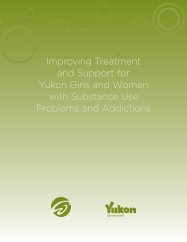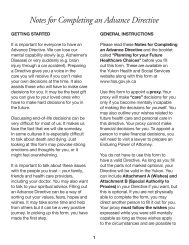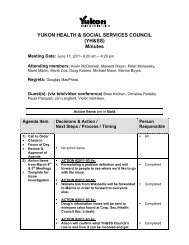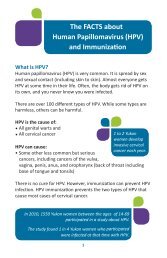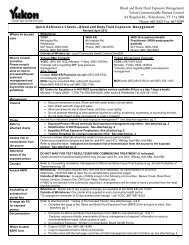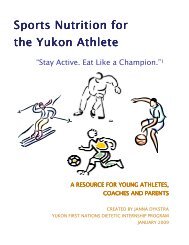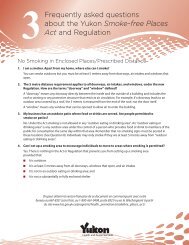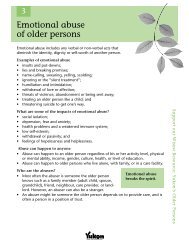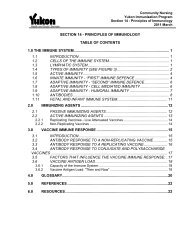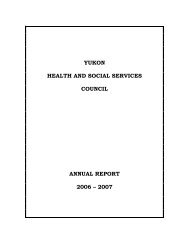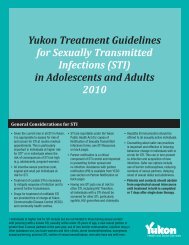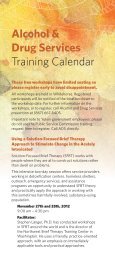Women and Alcohol: A women's health resource [2326.26 KB ]
Women and Alcohol: A women's health resource [2326.26 KB ]
Women and Alcohol: A women's health resource [2326.26 KB ]
Create successful ePaper yourself
Turn your PDF publications into a flip-book with our unique Google optimized e-Paper software.
<strong>Women</strong> <strong>and</strong> <strong>Alcohol</strong><br />
21<br />
alcohol limit to .02. In the early 2000s, the<br />
percentage of road deaths due to impaired<br />
driving fell as low as 16 to 17 per cent of the<br />
total; in Canada, the figures were as high as<br />
40 per cent. Today, Swedish percentages sit<br />
in the low 20s.<br />
Much of this success can be attributed<br />
to r<strong>and</strong>om breath testing. “This is a public<br />
that never drinks <strong>and</strong> drives,” says Andrew<br />
Murie, CEO of MADD Canada. “It’s a<br />
model country. Even though they’ve had<br />
their hiccups around imported alcohol,<br />
they have a very good control system with<br />
tremendous results.”<br />
Despite this success with drunk driving,<br />
Sweden — like most developed countries —<br />
is experiencing an uptick in risky drinking.<br />
Leena Haraké is concerned: the increase is<br />
not just for teenagers, but for smart, young,<br />
educated professionals, as well as the<br />
elderly. Two years ago, she commissioned<br />
a play called See You at the Bar! Based on<br />
the gruesome incident when she found the<br />
body by the side of the road, the play has<br />
been staged in Stockholm <strong>and</strong> beyond, as<br />
an educational piece. “The play describes<br />
the bar as the new living room for young<br />
women,” says Haraké. “It’s a powerful<br />
piece of work. No country is immune from<br />
these dangers.”<br />
The new tobacco?<br />
“Let’s say there’s a frog pond where<br />
some of the frogs are developing oddlooking<br />
growths, <strong>and</strong> others are sterile.<br />
Do you send in surgeons to remove the<br />
growths, <strong>and</strong> fertility experts to deal with<br />
the sterility? Or do you say to yourself:<br />
maybe there’s something in the water?” —<br />
Dan Reist, assistant director, knowledge<br />
exchange, Centre for Addictions Research<br />
of B.C.<br />
Is there something in the water? Robert<br />
Strang is certain there is. The chief medical<br />
officer of Nova Scotia knows that the<br />
culture of normalized heavy drinking is a<br />
serious <strong>and</strong> growing issue in Canada.<br />
“This is not an addiction issue,” says<br />
Strang. “Addiction is the far end of the<br />
spectrum. This is about the impact of<br />
alcohol right across society. Lots of harms<br />
are coming from those who are not addicted.<br />
Periodic, episodic binge drinking leads<br />
to acute <strong>and</strong> chronic problems in society.<br />
The problem with alcohol? We don’t<br />
acknowledge it as a drug. And we haven’t<br />
paid enough attention to it.”<br />
Strang is speaking over a cheese<br />
omelette at a chain hotel in Montreal. It’s<br />
a balmy Sunday, but he’s spending the day<br />
in an airless convention centre, addressing a<br />
crowd at a major <strong>health</strong> conference. Strang’s<br />
on a mission.<br />
“It’s about changing social norms,<br />
getting those communities already aware<br />
of the damage to work together — the<br />
medical community, the FASD community,<br />
the violence against women community,<br />
the road safety community, the Breast<br />
Cancer Foundation. We need to have a<br />
robust discussion about this issue: how<br />
does alcohol play out in your community?<br />
Canada is blessed with several renowned researchers, including Tim Stockwell<br />
In terms of suicides? Kids being abused?<br />
Violence? Teens in emergency rooms? Are<br />
we having an adult discussion? I don’t think<br />
so.”<br />
Strang is willing to jumpstart the<br />
dialogue. Is alcohol the new tobacco?<br />
Strang believes the answer is yes. A veteran<br />
of the tobacco fight, he is determined that<br />
the harm from drinking be recognized faster<br />
than it was with smoking. “We had to work<br />
30 or 40 years on tobacco,” he says. “If we<br />
apply what we learned on tobacco control<br />
concerning price, advertising <strong>and</strong> access,<br />
we could make significant progress on<br />
alcohol in a much shorter period of time.”<br />
What Strang is envisioning is a<br />
comprehensive public <strong>health</strong> response to the<br />
harm caused by alcohol. His province has an<br />
alcohol strategy. Ontario does not. In fact,<br />
most provinces don’t. It’s hard to imagine<br />
alcohol policy becoming a key priority of<br />
the Harper government, or any provincial<br />
government for that matter. What government<br />
dares tamper with our favourite drug?<br />
Strang is far from alone in his fight<br />
to move alcohol to the top of the public<br />
agenda. Canada is blessed with more than<br />
its fair share of renowned researchers on the<br />
alcohol file, a brain trust of internationally<br />
respected individuals. People such as the<br />
LUCAS OLENIUK/TORONTO STAR


![Women and Alcohol: A women's health resource [2326.26 KB ]](https://img.yumpu.com/22340649/21/500x640/women-and-alcohol-a-womens-health-resource-232626-kb-.jpg)
